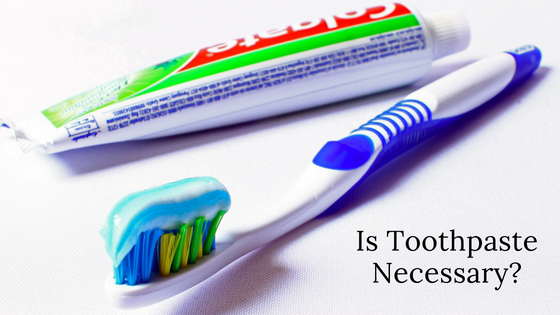If you’re one of the billions of people whose parents insisted that you brush your teeth with toothpaste at least twice a day, it may surprise you to find out that some people do not use toothpaste when they brush. Is toothpaste necessary to maintain good oral health? As a dentist whose been in practice for over three decades, here’s how I answer that question:
Is Toothpaste Necessary?
Toothpaste is not absolutely necessary for you to maintain good oral health. Many people substitute salt, baking soda or hydrogen peroxide, especially those who want to avoid some of the ingredients found in many commercial brands, such as artificial sweeteners.
However, the benefits provided by commercial dentifrice (the technical term for toothpaste) far outweigh the risks.
What’s In Toothpaste?
Most of the toothpaste brands found at your local pharmacy are approved by the American Dental Association. They display the organization’s seal of approval right on their packaging. I always answer, “yes!” when I’m asked, “is toothpaste necessary” because of these three ingredients:
- A Mild Abrasive
Most toothpaste contains calcium carbonate, silica, or hydroxyapatite (a mineral formula closely resembling a tooth’s structure), which are mild abrasives. They do a great job of cleaning and removing stains without damaging your teeth. People who use salt or baking soda as an abrasive often don’t realize that those agents are too abrasive to use when they brush because they can literally scour away tooth enamel and damage teeth and their roots. - Fluoride
Topical fluoride is considered the essential ingredient in toothpaste and is usually in the form of sodium fluoride, stannous fluoride or monofluorophosphate. It is not meant to be digested, which is why we are taught to rinse instead of swallow after brushing. Fluoride helps your teeth resist decay and can also make your teeth “harder” due to a process called remineralization. If you are using salt, baking soda, or toothpaste that does not contain fluoride, you should try to get it from another source. - A Surfactant
Surfactants are mild cleansers and are the reason toothpaste foams and spreads easily over your teeth. Sodium lauryl sulfate is the most common cleanser found in commercial brands. Without surfactants, your toothpaste would be cakey and dry up on your teeth – precisely what happens when you brush with baking soda alone.
There are two other ingredients found in many toothpaste brands that are designed to contribute to your overall oral health. The first is an antibacterial agent, most commonly triclosan. Studies show that adding antibacterial agents such as triclosan into toothpaste can help prevent gingivitis OPEN LINK IN NEW TAB, a common condition that can lead to periodontitis (gum disease) and even the loss of healthy teeth.
The second ingredient found in many toothpaste brands is there to help reduce sensitivity, particularly to hot or cold. The most common is potassium nitrate, which works by penetrating dentinal tubules, which are tiny tubes in the dentin layer of your teeth that communicate with the pulp. Sensodyne, OPEN LINK IN NEW TAB a brand specifically designed for sensitive teeth, contains potassium nitrate. People who suffer from sensitive teeth find this type of toothpaste necessary.
What About “All Natural” Toothpaste?
As I mentioned above, some people voice real concerns over the presence of artificial ingredients in toothpaste. Happily, some brands contain only natural sweeteners and also have the three essential ingredients (a mild abrasive, fluoride, and a surfactant) that make toothpaste necessary as part of good oral care. Check the ingredients before you buy.
So, Is Toothpaste Necessary? Yes!
In addition to the many benefits you get from using toothpaste when you brush, keeping your mouth and teeth healthy is critical to your overall health. In fact, there are five common diseases and health conditions which are linked to poor dental health – the most common being heart disease!
So, if you’re tempted to skip toothpaste – don’t! Toothpaste provides advantages and benefits that home substitutes can’t match. Related Reading:
Michael Sinkin practices cosmetic, implant, and restorative dentistry in New York City. He is known for the wonderful care he provides to his patients and for his wicked sense of humor! To contact Dr. Sinkin, link here.
